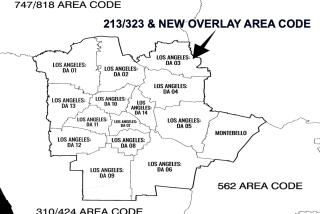PUC Pressured to Delay Area Code Overlay
- Share via
State regulators, under increasing pressure from lawmakers and phone customers in West Los Angeles and the South Bay, are poised today to consider delaying the July 17 launch of the 310 area code overlay plan.
But Public Utilities Commission members, who have been asked to consider alternatives to adding a second area code in the 310 region, must also address a larger issue: Numbering officials have already issued at least 600,000 phone numbers using the new 424 area code.
Several phone companies, including newcomers MediaOne and Nextlink Communications, strenuously oppose the last-minute moves by anti-overlay forces, who object to using 11-digit dialing (1 + area code + number) for all calls.
MediaOne, a cable company that has expanded into the local phone business, said it will be forced to curtail its phone service plans if the 424 numbers are not made available in July. The company has 50,000 new 424 phone numbers it has already entered into the national database, marking them for use in the harbor area covered by 310.
“To turn back now would cause competitive harm, especially since there’s no clear path forward,” said MediaOne’s John Gutierrez. “For our company, no phone numbers means no phone service.”
If the PUC decides to delay the overlay temporarily, it would automatically halt the issuance of additional 424 prefixes. It is unclear what would happen to the already-issued 424 numbers. The 310 overlay plan was approved by the PUC more than a year ago to deal with the fast-growing need for phone numbers in the region that reaches from Malibu to West Hollywood and from San Pedro to Lynwood.
In preparation for the overlay, the PUC mandated that callers in 310 begin using 11-digit dialing on all calls, even those within the same area code. The 11-digit process began a year ago and became mandatory April 17. The new 424 numbers are scheduled to begin service July 17.
The dialing change immediately sparked complaints from affected customers, including building owners whose dial-up entry systems had to be replaced to accommodate the overlay. But because implementation of the overlay is only three weeks away, businesses and residents may be left with a tough choice: Accept the overlay, switch to an area code split or risk a number shortage.
“Even just a six-month delay, without any relief, could prove troublesome pretty quickly,” said Steve Getzug, a spokesman for Pacific Bell. “The 310 region is a dynamic area, and there are big customers who have big needs--growing businesses that need phone lines for their new employees.”
Nationwide, increasing demand for phone lines has played a role in the need for more phone numbers. But much of the problem can be traced to the phone industry’s wasteful number-allocation system, which requires phone companies nationwide to accept blocks of 10,000 numbers--whether or not they need all of them.
In California, the problem is compounded by the hundreds of new telecommunications companies clamoring to do business in the state.
State Assemblyman Wally Knox (D-Los Angeles), U.S. Rep. Henry A. Waxman (D-Los Angeles) and 19 homeowners associations, businesses and residents filed a petition June 10 asking the PUC to temporarily block the launch of 424 and review whether the new code is needed.
“These are people who have cried wolf for decades, and they’re saying, ‘But now, please believe us, we really are running out of numbers,’ ” said Knox, who is leading the charge against the overlay and will testify before the PUC today. “It may be true, but I want to see the numbers first.”
After nearly two years of rationing in 310, only 61 prefixes--or 610,000 phone numbers--remain unassigned. Numbering officials already have handed out 731 prefixes to phone, paging and other companies serving West Los Angeles.
Because of strong demand, phone companies say an unusually high percentage of those phone numbers are already in use. In response to Knox’s move to delay the overlay, nearly a dozen phone and paging companies (many of whom opposed the overlay in the first place) filed objections with the commission. The companies said that even if the number-allocation system could be quickly changed to save numbers, the fixes could not be made in time to avoid a split or overlay in the 310 region.
Knox and others remain skeptical. “There is no need for the July 17 overlay--none,” Knox said. “But if there is a real emergency, the PUC can always say, ‘Sorry, we’re going to go ahead.’ ”
More to Read
Sign up for Essential California
The most important California stories and recommendations in your inbox every morning.
You may occasionally receive promotional content from the Los Angeles Times.













